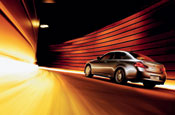Yet looking beyond the pizzazz, the team behind Infiniti was seeking to make a very serious point - effectively stating Nissan's intention to compete with the big boys in the luxury car sector, such as German firms BMW, Mercedes and Audi.
Infiniti is an unknown quantity on these shores, but motor enthusiasts will know it has had a presence in the US since 1989. The marque, which will go on sale in the UK in April 2009, but launches on mainland Europe in October this year, is doing relatively well across the Atlantic, having sold 134,000 cars there last year; it also launched in the Russian market in 2006.
TBWA\Paris has been rolling out teaser ads for Infiniti in mainland Europe and will also provide creative for the UK market nearer to launch. It is hoped that the campaign will help the marque reach its target of 25,000 sales a year by 2013 across Western Europe during its staggered five-year launch.
To generate further interest, Infiniti is launching a magazine called Adeyaka - the Japanese word for bewitching or fascinatingly elegant - a 200-page newsstand title, with a cover price of £20. This, combined with the establishment of a network of dealerships that Nissan claims will have a 'boutique feel', is indicative of its ambition.
The plan was 'to go big or [not] at all', according to Andreas Sigl, head of marketing communications at Infiniti. 'Our principle is to be everything to some people, rather than something to everybody,' he says. 'We are competing for some of our German rivals' customers, but that does not mean we will compete like them. Our behaviour will be closer to that of Lamborghini or Apple in their early days, as opposed to traditional automotive.'
Yet these are difficult times for the UK luxury car market. The Infiniti range, which comprises the G37 saloon and G37 Coupe, rivals to BMW's 3 Series; the EX37, expected to take on the Audi QS and BMW X3; and its FX50, the most recent addition, which will go head-to-head with the Porsche Cayenne and Range Rover. However, it could face an uphill battle to grab the market share it lusts after.
Mark Fulthorpe, an auto analyst at CSM Worldwide, describes the UK automotive market as 'stagnant', adding that Infiniti will 'face a significant headwind'. He also has doubts about the type of models Infiniti will launch. 'The FX50 is not exactly running with opinion,' he says. 'It's a big SUV, and there's a consciousness for less aggressively styled vehicles.'
Fellow analyst Colin Couchman, meanwhile, who works for Global Insight, describes Infiniti's timing as 'unfortunate'. His company expects the UK car market to decline by 3.5% this year and the luxury category to fall by as much as 6%.
Another of Infiniti's main challenges will be creating sufficient differentiation between its luxury offering and its 'normal' brand.
This is a problem that marques such as BMW and Mercedes have not had to grapple with, unlike Toyota, and its luxury brand, Lexus. It could be hard to pull off taking into account the discerning nature of European customers. 'In Europe, there has always been the idea that a Lexus is also a Toyota, and when Jaguar brought in the X-Type, the press had a field day pointing out it was using the basic engineering of a Ford Mondeo,' says Couchman.
Infiniti's ride will be less than smooth, he adds, as the European market is 'tightly controlled by Teutonic players who have massive customer loyalty'.
For the moment, Infiniti's soon-to-be European rivals claim to be relishing the added competition. A spokesman for BMW said that it had faced this type of threat before when Lexus entered the market 20 years ago, but 'welcomed the competition, as it drives us forward, and keeps us on our toes'.
Similarly, a Mercedes spokesman said it, too, was confident that its 120-year history and high-quality engineering would enable it to maintain its position in the market.
Whether Infiniti will remain a topic for debate in 20 years' time is a moot point. However, as Couchman notes, the marque has set sensible targets and is 'playing a long game'. It may yet challenge the Teutonic giants.
Data File: luxury cars
- According to analysts, Infiniti's main rivals in the UK will be the behemoths of the luxury sector - BMW, Mercedes and Audi.
- BMW achieved the highest sales in the UK last year at 121,575 units, according to CSM Worldwide. It was followed by Mercedes-Benz with 108,061, and Audi with 100,864.
- BMW's most popular models were its 3 Series, 1 Series and 5 Series, which sold 58,544, 23,190 and 19,974 respectively. Mercedes' were the C-Class (25,163), Sprinter (17,601) and E-Class (13,147). Audi's were the A4 (33,918), A3 (29,892) and A6 (14,918).
- Total car sales in the UK in 2007 reached 2,744,843. Of the three, BMW had the highest market share (4.4%), followed by Mercedes (3.9%) and Audi (3.7%)
- Lexus sold 15,119 cars in the UK last year, a market share of 3% of the premium sector, according to Global Insight.


